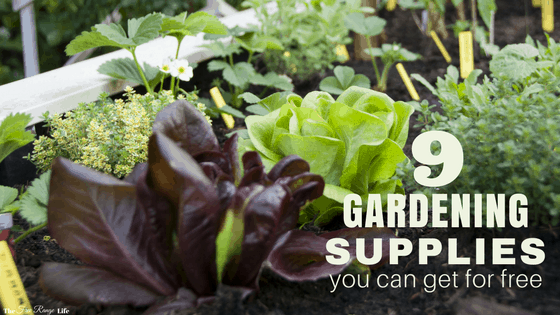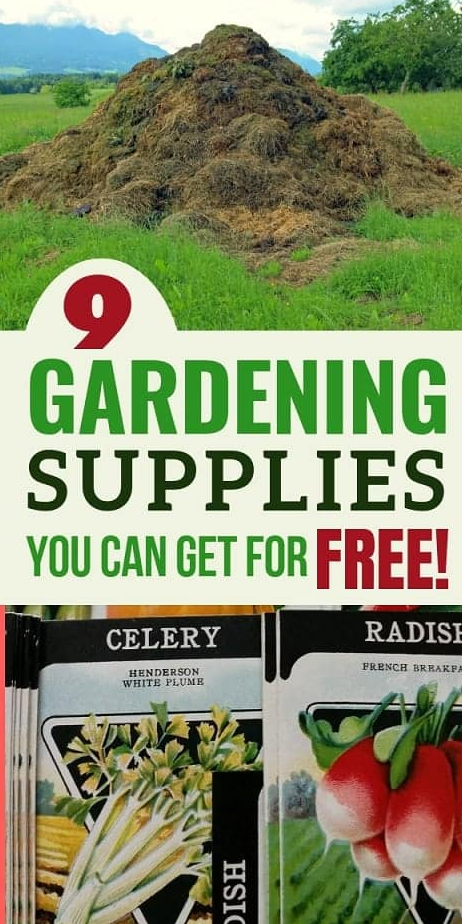
One of the biggest reasons people avoid starting a garden is the cost. They start thinking about buying seeds, plants, soil additives, tomato cages, and all the tools they might need. Sure, gardening can get expensive, but it doesn’t have to be.

If you want to grow your own food without breaking the bank, there are plenty of gardening supplies you can get cheaply or even for free. It might take a bit of time and planning to find these alternatives, but if you’re looking to save money, you’ll be surprised at how easy it can be to garden on a budget. Here are 9 gardening supplies you can get for free:
1. Mulch
Mulching is super important in gardening. It helps keep weeds at bay, retains moisture, and prevents soil erosion. Plus, if you mulch in the fall, it can reduce the need to till the soil later. And the best part? Many mulching materials are free!
You can use grass clippings from your lawn or ask neighbors to share if they bag theirs. Old newspapers are great for blocking weeds and can be used as mulch. Try asking local stores for leftover newspapers from the previous day or gather some from your neighborhood or office.
Tree services often need to get rid of wood chips, so give them a call. They might even deliver them to you for free. Don’t forget to grab fall leaves—they can make excellent mulch, too. If your neighbors rake and bag their leaves, ask if you can take them off their hands.

2. Compost
Compost is essential for healthy soil, which is key to a successful garden. Most soils are nutrient-deficient these days, so amending them is important. Fortunately, you can make your own compost for free!
You can start a compost pile in your yard, dig holes directly in your garden to bury food scraps, or even make a worm composter to keep under the sink. You can also find free compost materials like chopped leaves or even used hay and animal manure. Call up local farms or check Freecycle and Craigslist to find free manure, especially if you’re willing to load it yourself.

3. Seeds
No garden is complete without seeds! But don’t worry, there are plenty of ways to get them without spending much.
Join a seed exchange! Even if you don’t have seeds to share this year, you can still join in with the promise to save seeds from this season’s harvest for next year.
You can also save seeds from the organic produce you already buy, like melons, squash, tomatoes, peppers, and cucumbers. Just make sure the produce is organic, as conventionally grown items might not produce viable seeds.
Some stores will give away or discount last year’s seeds. Ask around or look for them after they’ve been taken off the shelves but before they’re thrown away.

4. Plant Starts
Starting plants from seed can be tricky, especially if you’re a beginner. But there are ways to get started plants for free.
Sometimes stores throw out plants that are looking a bit wilted. We’ve gotten free sweet potato and zucchini seedlings just by being there when the rep was restocking. They weren’t in perfect shape, but after a little TLC, they grew just fine.
You can also barter with friends who grow their own plants. Maybe they’d be willing to trade seedlings or plants for a service you can provide.
Don’t forget—many store-bought organic veggies can be regrown! You can regrow onions from the root tips or celery from its cut-off ends. Potatoes with eyes can sprout and grow into new plants, and sweet potatoes can sprout new slips in water.
5. Plant Cuttings
Some plants are super easy to propagate from cuttings. Blackberries, raspberries, and strawberries all send out shoots or runners that you can transplant. Many perennial herbs, like rosemary, will root in water.
If you know someone with these types of plants, ask if you can take some cuttings. Or, if you have wild plants nearby, like wild blackberries or wineberries, you can dig up some shoots and propagate them in your garden (just make sure you have permission if they aren’t on your property).
You can even root suckers from tomato plants in moist soil to grow new plants.

6. Seed Starting Containers
Buying seed starting containers can add up fast, but you don’t need to spend money. Use what you already have!
Recyclables like yogurt cups, milk cartons, or egg cartons work great as seed starters. Just poke some holes in the bottom for drainage, fill with soil, and plant your seeds. You can also use old clementine orange boxes.
For an eco-friendly option, you can even make seed pots from recycled newspaper.
Keep an eye out on Freecycle or Craigslist for people giving away or selling used planters or pots.
7. Bamboo
Bamboo is incredibly useful for staking plants like tomatoes or growing vertical crops like cucumbers and peas. It’s often available for free if you know where to look!
Check Freecycle or Craigslist for bamboo plots people want to get rid of. You might even be able to cut it yourself!

8. Pallets
Wooden pallets are another great free resource. You can use them to build fences, compost bins, or even a trellis. You can also fill them with soil and turn them into a vertical garden for herbs or greens.
Check your local feed store or brewery—they often have extra pallets they need to get rid of. Keep an eye out behind businesses or on the side of the road, as many places leave pallets for free pickup.
Again, sites like Freecycle and Craigslist can be helpful!
9. Tools
Tools are often seen as the biggest expense in gardening, but you don’t need to buy everything on your list.
By mulching heavily, you can avoid tilling and reduce the need for many tools. Weeding is easier if you mulch, too, so you won’t need as many tools for upkeep. In many cases, your hands are your best tool. You can use them to dig, plant, and pull up weeds.
If you do need a specific tool, try borrowing it from a neighbor or friend. Or, barter for its use. And, of course, check Freecycle and Craigslist for free or used gardening tools.
By following these tips, you can get almost everything you need to start a garden for free. That means the food you grow will be completely free too! How do you save money in your garden?
